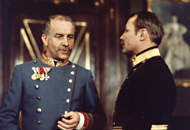Reigen
The dialogue between the husband and the sweet young girl had the most explicit 'sex and death' subtext that I found in the play. In part of the interchange the husband quizzes her casually about how many men she has been with, and could have just as easily been from a contemporary play about sexuality. She asks him why he wants to know and is "curious because I love you." It's the most shocking part of the play to me, his single-minded pursuit of some clue that might indicate she were diseased: he does not want a "professional" who might have syphilis. He lies about his question because it would break the spell. He goes over what she will say to her mother once he knows she is just a "sweet" girl, and makes sure he knows none of her family will come after him (what does your older brother do?), probes her for class earmarks (he asks where she gets theatre tickets, but this could be to make sure she didn't get them from a boyfriend) so he can be sure she is a lower class girl who will not get him into trouble.



1 comment:
I really like your analysis about this scene. What you think of the “sweet young girl” and the “poet?” Does the inference in that scene that she is a manipulative liar
change your view of her exchange with the husband? She does not tell the truth about her sexual conquests or her experiences. She is searching for a way to climb up the social ladder and does not really seem to care how she does it. In my opinion, she and the young man are the two most dishonest characters in this play. The young man is simply playing around, living a pointless, degenerate life. However, she is little better than a prostitute, she is looking for a sugar daddy, preferably one that will indulge her whims. Maybe with the poet she is looking for something more permanent…or she is already the married man’s mistress and is looking for a little diversion. No matter how you look at the “sweet young girl,” she is not as sweet as she seems. She is not what she is trying to pretend she is, and because of that, all her words are suspect. She tells the husband that he reminds her of her first love, but perhaps that is what she tells all the men who take her to private rooms.
On a somewhat unrelated vein, I particularly enjoyed this section of dialogue between the poet and the girl:
Sweet young girl: “I thought you were a doctor, Robert.”
Poet: “Why? I told you I was a writer.”
Sweet young girl: “But all the writers are doctors.”
Is this a reference to her previous conquests or reference to Schnitzler’s early years as a doctor? Is the poet really Schnitzler? The poet is so condescending toward her, but did she go with him because she thought that he had a better social position than just a writer?
Post a Comment